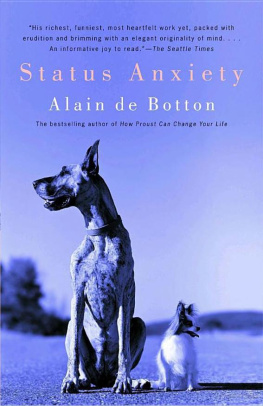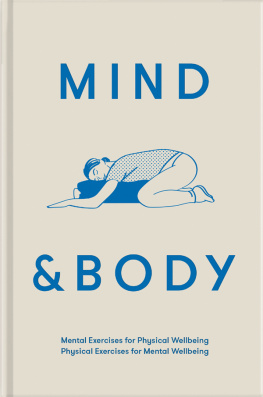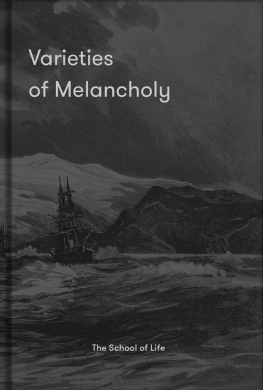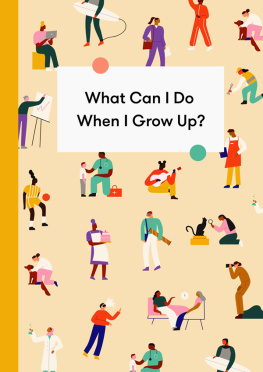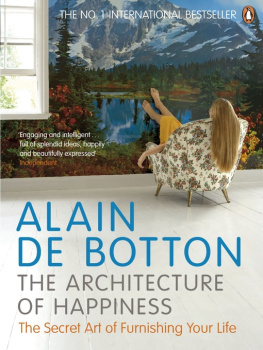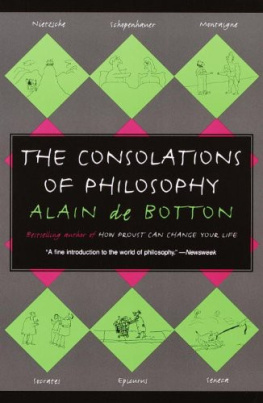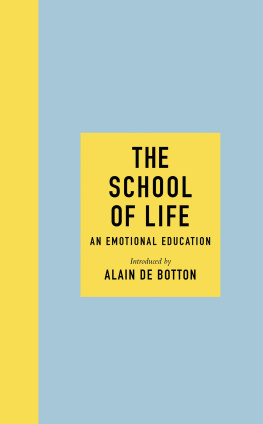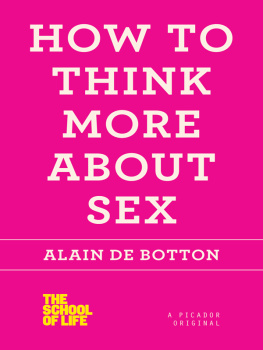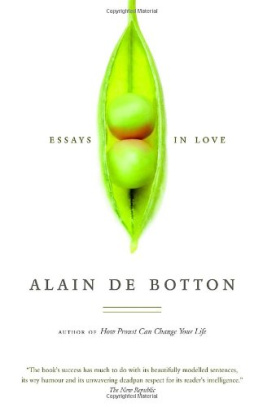Alain De Botton - Status Anxiety
Here you can read online Alain De Botton - Status Anxiety full text of the book (entire story) in english for free. Download pdf and epub, get meaning, cover and reviews about this ebook. year: 2005, publisher: Vintage, genre: Romance novel. Description of the work, (preface) as well as reviews are available. Best literature library LitArk.com created for fans of good reading and offers a wide selection of genres:
Romance novel
Science fiction
Adventure
Detective
Science
History
Home and family
Prose
Art
Politics
Computer
Non-fiction
Religion
Business
Children
Humor
Choose a favorite category and find really read worthwhile books. Enjoy immersion in the world of imagination, feel the emotions of the characters or learn something new for yourself, make an fascinating discovery.
- Book:Status Anxiety
- Author:
- Publisher:Vintage
- Genre:
- Year:2005
- Rating:4 / 5
- Favourites:Add to favourites
- Your mark:
- 80
- 1
- 2
- 3
- 4
- 5
Status Anxiety: summary, description and annotation
We offer to read an annotation, description, summary or preface (depends on what the author of the book "Status Anxiety" wrote himself). If you haven't found the necessary information about the book — write in the comments, we will try to find it.
Status Anxiety — read online for free the complete book (whole text) full work
Below is the text of the book, divided by pages. System saving the place of the last page read, allows you to conveniently read the book "Status Anxiety" online for free, without having to search again every time where you left off. Put a bookmark, and you can go to the page where you finished reading at any time.
Font size:
Interval:
Bookmark:
p. AP Photo; p. Mary Evans Picture Library; p. Stapleton Collection, UK/Bridgeman Art Library; p. The Hoover Company; p. Reprinted by arrangement with Sears, Roebuck and Co. Protected under copyright. No duplication permitted; p. 2223 GURSKY Andreas Gursky/DACS London 2003, Courtesy Gallery Monika Sprueth, Cologne, 2003; p. Galleria dellAccademia, Venice/Bridgeman Art Library; p. The British Library, London; p. Corpus Christi College, Oxford/ Bridgeman Art Library; p. Muse Cond, Chantilly/Bridgeman Art Library; p. Bettmann/Corbis; p. Punch Ltd.; p. National Gallery of Art, Washington DC/Bridgeman Art Library; p. 1389 Ashmolean Museum, Oxford/Bridgeman Art Library; p. National Museum and Gallery of Wales, Cardiff/Bridgeman Art Library; p. Museum Oskar Reinhart am Stadtgarten, Winterthur; p. Kunstin-dustrimuseet, Copenhagen/photo: Pernille Klemp; p. 1445 Nivaagaards Malerisamling, Denmark; p. Muse Cond, Chantilly/Bridgeman Art Library; p. Muse de la Ville de Paris, Muse Carnavalet, Paris/ Bridgeman Art Library; p. Louvre, Paris/Bridgeman Art Library; p. 1623 Courtesy of the Warden and Scholars of New College, Oxford/ Bridgeman Art Library; p. Courtesy of the Warden and Scholars of New College, Oxford/Bridgeman Art Library; p. Punch Ltd.; p. 168t The New Yorker Collection 1995 Peter Steiner from cartoonbank.com. All Rights Reserved; p. 168b The New Yorker Collection 1987 J. B. Handels-man from cartoonbank.com. All Rights Reserved; p. 169t The New Yorker Collection 1980 Charles Barsotti from cartoonbank.com. All Rights Reserved; p. 169m The New Yorker Collection 1988 Bernard Schoen-baum from cartoonbank.com. All Rights Reserved; p. 169b The New Yorker Collection 1988 Mike Twohy from cartoonbank.com. All Rights Reserved; p. The New Yorker Collection 1998 Michael Crawford from cartoonbank.com. All Rights Reserved; p. The New Yorker Collection 1997 Frank Cotham from cartoonbank.com. All Rights Reserved; p. The New Yorker Collection 1988 William Hamilton from cartoonbank. com. All Rights Reserved; p. Mercedes-Benz/Campbell Doyle Dye; p. Intercontinental Hotels Corporation; p. Agency Merkley Newman Harty; p. photo: Alan Mahon/Horton Stephens photographers agents; p. Muse de Tesse, Le Mans/Bridgeman Art Library; p. Private Collection/Lauros/Giraudon/Bridgeman Art Library; p. Louvre, Paris/Bridgeman Art Library; p. 2323 Courtesy of the Trustees of Sir John Soanes Museum, London/Bridgeman Art Library; p. Stapleton Collection, UK/Bridgeman Art Library; p. Staple-ton Collection, UK/Bridgeman Art Library; p. 240241 Corcoran Gallery of Art, Washington, DC; p. 2423 Bolton Museum & Art Gallery, Lancashire, England; p. 2445 The Collection of the Newark Museum, Newark, NJ. Purchase 1961 The Members Fund, 61.516; p. Lauros/ Giraudon/Bridgeman Art Library; p. London Aerial Photo Library/ Corbis; p. 2623 Architectural Association Photo Library/Mary Parsons; p. Lee Miller Archives, Chiddingly, England; p. Louvre, Paris/Bridgeman Art Library; p. Muse Fabre, Montpellier/ Bridgeman Art Library; p. Lee Miller Archives, Chiddingly, England; p. 28081 Yale Center for British Art, Paul Mellon Collection, USA/Bridgeman Art Library; p. Galleria Pictogramma, Rome/ Bridgeman Art Library/Alinari.
Special thanks to: Simon Prosser, Caroline Dawnay,
Nicole Aragi, Dan Frank, Rahel Lerner, Michael
Ledger Lomas, Michael Port, Dominic Houlder,
Tom Graves, Felicity Harvey and Austin Taylor.
On Love
The Romantic Movement
Kiss & Tell
How Proust Can Change Your Life
The Consolations of Philosophy
The Art of Travel
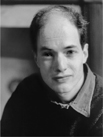
Alain de Botton
STATUS ANXIETY
Alain de Botton is the author of three previous works of fiction and three of nonfiction, including The Art of Travel, The Consolations of Philosophy, and How Proust Can Change Your Life. He lives in London. More information can be found at www.alaindebotton.com.

LOVELESSNESS
Every adult life could be said to be defined by two great love stories. The firstthe story of our quest for sexual loveis well known and well charted, its vagaries form the staple of music and literature, it is socially accepted and celebrated. The secondthe story of our quest for love from the worldis a more secret and shameful tale. If mentioned, it tends to be in caustic, mocking terms, as something of interest chiefly to envious or deficient souls, or else the drive for status is interpreted in an economic sense alone. And yet this second love story is no less intense than the first, it is no less complicated, important or universal, and its setbacks are no less painful. There is heartbreak here too.
Adam Smith, The Theory of Moral Sentiments (Edinburgh, 1759): To what purpose is all the toil and bustle of this world? What is the end of avarice and ambition, of the pursuit of wealth, of power and pre-eminence? Is it to supply the necessities of nature? The wages of the meanest labourer can supply them. What then are the advantages of that great purpose of human life which we call bettering our condition?
To be observed, to be attended to, to be taken notice of with sympathy, complacency, and approbation, are all the advantages which we can propose to derive from it. The rich man glories in his riches because he feels that they naturally draw upon him the attention of the world. The poor man on the contrary is ashamed of his poverty. He feels that it places him out of the sight of mankind. To feel that we are taken no notice of necessarily disappoints the most ardent desires of human nature. The poor man goes out and comes in unheeded, and when in the midst of a crowd is in the same obscurity as if shut up in his own hovel. The man of rank and distinction, on the contrary, is observed by all the world. Everybody is eager to look at him. His actions are the objects of the public care. Scarce a word, scarce a gesture that fall from him will be neglected.
The predominant impulse behind our desire to rise in the social hierarchy may be rooted not so much in the material goods we can accrue or the power we can wield as in the amount of love we stand to receive as a consequence of high status. Money, fame and influence may be valued more as tokens ofand means tolove rather than ends in themselves.
How may a word, generally used only in relation to what we would expect or hope for from a parent, or a romantic partner, be applied to something we might want from and be offered by the world? Perhaps we can define love, at once in its familial, sexual and worldly forms, as a kind of respect, a sensitivity on the part of one person to anothers existence. To be shown love is to feel ourselves the object of concern: our presence is noted, our name is registered, our views are listened to, our failings are treated with indulgence and our needs are ministered to. And under such care, we flourish. There may be differences between romantic and status forms of lovethe latter has no sexual dimension, it cannot end in marriage, those who offer it usually bear secondary motivesand yet status beloveds will, just like romantic ones, enjoy protection under the benevolent gaze of appreciative others.
Font size:
Interval:
Bookmark:
Similar books «Status Anxiety»
Look at similar books to Status Anxiety. We have selected literature similar in name and meaning in the hope of providing readers with more options to find new, interesting, not yet read works.
Discussion, reviews of the book Status Anxiety and just readers' own opinions. Leave your comments, write what you think about the work, its meaning or the main characters. Specify what exactly you liked and what you didn't like, and why you think so.

